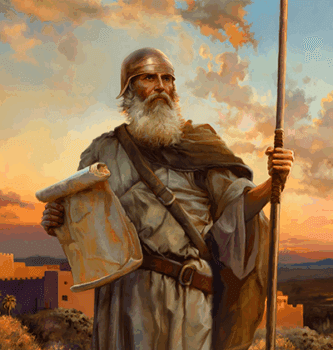4: The Conflict Behind All Conflicts – Teaching Plan
Key Thought: Israel’s wars reflect the cosmic conflict between good and evil and anticipate God’s end-time judgment of present history on earth.
God’s end-time judgment of present history on earth.
October 25, 2025
1. Have a volunteer read Revelation 12:7-9, Isaiah 12:12-14.
- Ask class members to share a short thought on what the most important point is in this passage.
- What do we know about the conflict between God and Satan?
- Personal Application: In what ways do we see in the world around us and in our lives, the reality of the conflict between good and evil? Share your thoughts.
- Case Study: One of your relatives states, “Why did God command Israel to go to war? I thought the war was a spiritual one, but here it seems to be literal and physical as well?” How would you respond to your relative?
2. Have a volunteer read Joshua 5:13-15, Nehemiah 9:6, Isaiah 37:16.
- Ask class members to share a thought on what the most important point in this text is.
- What does this say about the background of Canaan’s conquest?
- Personal Application: What comfort can we draw from knowing that the commander of the Lord’s army is working to defend His people? Share your thoughts.
- Case Study: One of your friends states, “How do we know that the commander of the Lord’s army is Jesus? I thought it was Michael, the Archangel, that was the head of the angels, the Lord’s army?” How would you respond to your friend?
3. Have a volunteer read Exodus 14:13,14,25.
- Ask class members to share a short thought on what the most important point in this text is.
- What was God’s original plan concerning Israel’s involvement in warfare?
- Personal Application: If complaining against God caused Israel’s enemies to attack them, what does that tell us about us today when we complain against God? Share your thoughts.
- Case Study: One of your neighbors states: “Is it complaining against God if we are not satisfied or happy with our church leadership – whether at the General Conference or local conference or our local church?” How would you respond to your neighbor?
4. Have a volunteer read Joshua 6:15-20. Exodus 17:7-13.
- Ask class members to share a thought on what the most important point in this text is.
- What are the similarities and differences in these two narratives?
- Personal Application: Many times we want to see who’s on our side in a disagreement, but how can we stand still and wait for the Lord to fight for us in our spiritual battles? Share your thoughts.
- Case Study: Think of one person who needs to hear a message from this week’s lesson. Tell the class what you plan to do this week to share with them.
(“Truth that is not lived, that is not imparted, loses its life-giving power, its healing virtue. Its blessings can be retained only as it is shared.” Ministry of Healing, p. 148)
